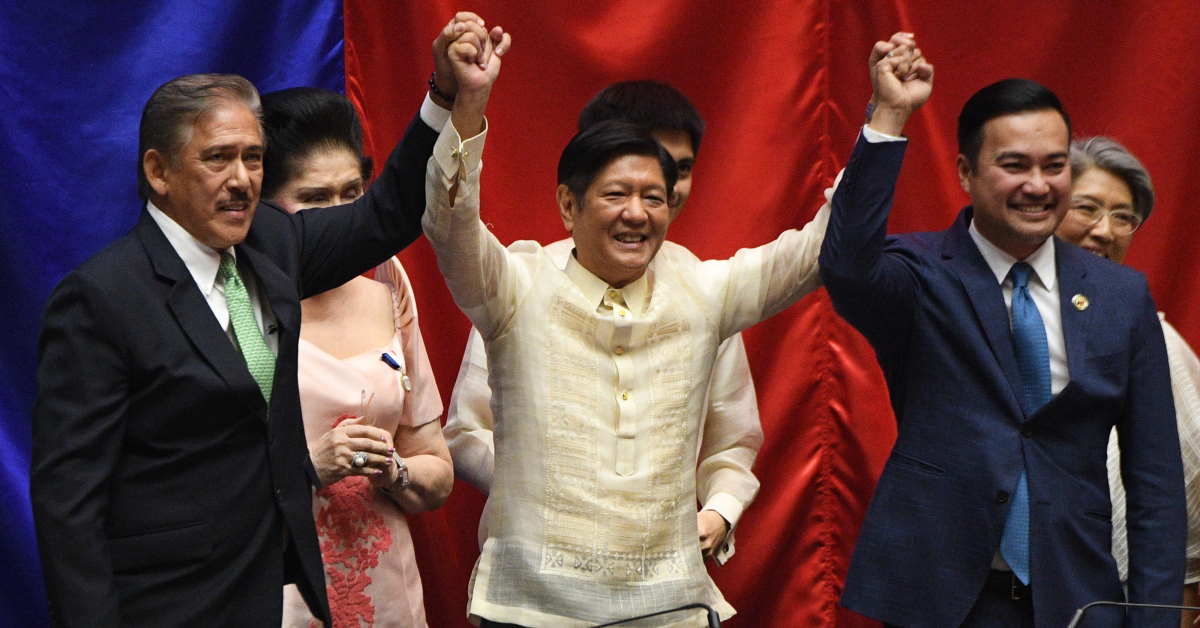Philippine president-elect Ferdinand Marcos Jr said Thursday he would uphold an international ruling against Beijing over the disputed South China Sea (SCS), insisting he would not let China trample on Manila's maritime rights.
China claims almost all of the resource-rich waterway, through which trillions of dollars in trade passes annually, with competing claims from the Philippines, Brunei, Malaysia, Taiwan and Vietnam.
Beijing has ignored a 2016 decision by The Hague-based Permanent Court of Arbitration (PCA) that declared its historical claim to be without basis.
Outgoing President Rodrigo Duterte fostered warmer ties with his more powerful neighbour by setting aside the ruling in exchange for promises of trade and investment, which critics say have not materialised.
In his strongest comments yet on the longstanding source of tensions between the two nations, Marcos Jr said he would not "allow a single millimetre of our maritime coastal rights to be trampled upon".
"We have a very important ruling in our favour and we will use it to continue to assert our territorial rights. It is not a claim. It is already our territorial right," he told selected local media.
"We're talking about China. We talk to China consistently with a firm voice."
But he added: "We cannot go to war with them. That's the last thing we need right now."
Chinese foreign ministry spokesman Wang Wenbin said Beijing's position on the international ruling had not changed.
"China is willing to continue communication and dialogue with the Philippines to appropriately handle differences, and together uphold the peace and stability of the South China Sea region," Wang said.
'Friends With Everyone'
Marcos Jr, popularly known as Bongbong, secured more than half of the votes in the 9 May election to win the presidency by a wide margin and cap a remarkable comeback for his family.
His father and namesake ruled the Philippines for 20 years, presiding over widespread corruption and human rights abuses before he was ousted in 1986.
Marcos Jr formally takes office on 30 June.
He and his running mate Sara Duterte, who also won the vice-presidential race in a landslide, have embraced key policies of the elder Duterte.
But Marcos Jr signalled that on foreign policy he would not adopt the "slightly unorthodox approach" of Duterte, who rattled diplomats with his firebrand rhetoric and mercurial nature.
The president-elect indicated he would seek to strike a balance between China and the United States (US), which are vying to have the closest ties with his administration.
"We are a small player amongst very large giants in geopolitics. We have to ply our own way," said Marcos Jr.
"I do not subscribe to the old thinking of the Cold War where we had this spheres of influence where you're under the Soviet Union or you're under the United States," he said.
"I think that we have to find an independent foreign policy where we are friends with everyone. It's the only way."
The US has a complex relationship with the Philippines – and the Marcos family.
After ruling the former US colony for two decades with the support of Washington, which saw him as a Cold War ally, Marcos senior went into exile in Hawaii in the face of mass protests and with the nudging of the US in 1986.
As regional tensions remain high, Washington is keen to preserve its security alliance with Manila that includes a mutual defence treaty and permission for the US military to store defence equipment and supplies on several Philippine bases.
The SCS was a key obstacle in Manila's ties with Beijing and needed to be resolved, said Chester Cabalza of the Manila-based think tank International Development and Security Cooperation.
If Marcos Jr and Chinese President Xi Jinping do not engage on the issue, "Beijing will have an upper hand in terms of our strategic relations with China", he said.
